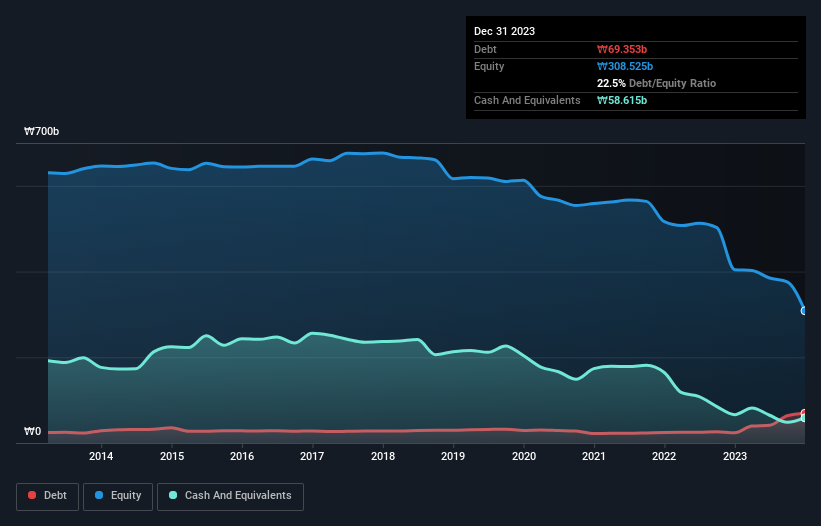Howard Marks put it nicely when he said that, rather than worrying about share price volatility, 'The possibility of permanent loss is the risk I worry about... and every practical investor I know worries about.' So it might be obvious that you need to consider debt, when you think about how risky any given stock is, because too much debt can sink a company. Importantly, Daekyo Co., Ltd. (KRX:019680) does carry debt. But the more important question is: how much risk is that debt creating?
Why Does Debt Bring Risk?
Generally speaking, debt only becomes a real problem when a company can't easily pay it off, either by raising capital or with its own cash flow. Part and parcel of capitalism is the process of 'creative destruction' where failed businesses are mercilessly liquidated by their bankers. However, a more frequent (but still costly) occurrence is where a company must issue shares at bargain-basement prices, permanently diluting shareholders, just to shore up its balance sheet. Having said that, the most common situation is where a company manages its debt reasonably well - and to its own advantage. The first step when considering a company's debt levels is to consider its cash and debt together.
See our latest analysis for Daekyo
What Is Daekyo's Debt?
As you can see below, at the end of December 2023, Daekyo had ₩69.4b of debt, up from ₩23.9b a year ago. Click the image for more detail. However, it does have ₩58.6b in cash offsetting this, leading to net debt of about ₩10.7b.

How Strong Is Daekyo's Balance Sheet?
According to the last reported balance sheet, Daekyo had liabilities of ₩211.3b due within 12 months, and liabilities of ₩84.7b due beyond 12 months. Offsetting these obligations, it had cash of ₩58.6b as well as receivables valued at ₩26.2b due within 12 months. So its liabilities outweigh the sum of its cash and (near-term) receivables by ₩211.2b.
This deficit is considerable relative to its market capitalization of ₩216.0b, so it does suggest shareholders should keep an eye on Daekyo's use of debt. This suggests shareholders would be heavily diluted if the company needed to shore up its balance sheet in a hurry. There's no doubt that we learn most about debt from the balance sheet. But ultimately the future profitability of the business will decide if Daekyo can strengthen its balance sheet over time. So if you're focused on the future you can check out this free report showing analyst profit forecasts.
Over 12 months, Daekyo made a loss at the EBIT level, and saw its revenue drop to ₩660b, which is a fall of 3.4%. That's not what we would hope to see.
Caveat Emptor
Importantly, Daekyo had an earnings before interest and tax (EBIT) loss over the last year. Its EBIT loss was a whopping ₩28b. When we look at that and recall the liabilities on its balance sheet, relative to cash, it seems unwise to us for the company to have any debt. Quite frankly we think the balance sheet is far from match-fit, although it could be improved with time. However, it doesn't help that it burned through ₩19b of cash over the last year. So in short it's a really risky stock. When we look at a riskier company, we like to check how their profits (or losses) are trending over time. Today, we're providing readers this interactive graph showing how Daekyo's profit, revenue, and operating cashflow have changed over the last few years.
At the end of the day, it's often better to focus on companies that are free from net debt. You can access our special list of such companies (all with a track record of profit growth). It's free.
New: Manage All Your Stock Portfolios in One Place
We've created the ultimate portfolio companion for stock investors, and it's free.
• Connect an unlimited number of Portfolios and see your total in one currency
• Be alerted to new Warning Signs or Risks via email or mobile
• Track the Fair Value of your stocks
Have feedback on this article? Concerned about the content? Get in touch with us directly. Alternatively, email editorial-team (at) simplywallst.com.
This article by Simply Wall St is general in nature. We provide commentary based on historical data and analyst forecasts only using an unbiased methodology and our articles are not intended to be financial advice. It does not constitute a recommendation to buy or sell any stock, and does not take account of your objectives, or your financial situation. We aim to bring you long-term focused analysis driven by fundamental data. Note that our analysis may not factor in the latest price-sensitive company announcements or qualitative material. Simply Wall St has no position in any stocks mentioned.
About KOSE:A019680
Undervalued with adequate balance sheet.
Market Insights
Community Narratives




